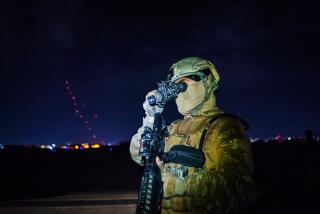Right Response to a Balkan Pogrom : A European problem? Yes, but U.S. must help
- Share via
The following remarkable exchange occurred Aug. 9 on an ABC News program:
David Brinkley: “General, as I understand it, the U.N. resolution, when it comes about, will allow the use of some sort of force to make it possible to deliver food and medicine to the Bosnians. If that is the case, we will be taking in food and medicine while the Serbians continue to kill them.” Brent Scowcroft: “Yes, I wouldn’t deny that, David. I think, again, it points up the terrible nature of this conflict.”
That isn’t all it points up. The Muslims of Bosnia-Herzegovina are being subjected to a series of pogroms in full view of world opinion. “Humanitarian assistance” is simply not a fitting response to a pogrom. What is?
If a regional police force existed, the response would be to call the police. NATO was not called into existence to keep the regional peace but to wage the Cold War; but can it, should it begin to move from the tough job of soldiering to the tougher job of policing? And should the United States assist in this transition?
It is indeed tougher to be a policeman than to be a soldier. The soldier “gets the job done” and goes home. The policeman is home already, and the job is never done. If NATO intervenes in Yugoslavia, its aim cannot be a decisive, military defeat of Serbia any more than the aim of the Los Angeles police can be decisive, military defeat of the Bloods and the Crips. The war against crime is never won--it is a quagmire by definition. But to avoid this quagmire altogether is a far greater peril than to enter it.
Many--among them, apparently, Acting Secretary of State Lawrence S. Eagleburger--expect Serbian “ethnic cleansing” to begin soon in Kosovo, nominally a province of Serbia but 90% ethnic Albanian and Muslim. NATO has already discovered, in aiding Sarajevo, that a small commitment of troops can have an unexpectedly large effect. As the Serbs have many enemies on the ground, so any intervenor against them has many allies. In Kosovo those allies would be 90% of the population, with, potentially, a safe haven just across the border in Albania. If a police action against Serbia is to begin anywhere, here might be the best place.
Acting Secretary Eagleburger, initially reluctant even to recognize the breakaway Yugoslav republics, has also been loathe to support armed U.S. intervention. And, at one level, with reason: There is obviously little domestic political payoff in rescuing Muslims from Serbs. But just as the cost of policing the high-crime neighborhoods of a city serves even the low-crime neighborhoods, so the cost of checking--not, we stress, defeating--Serbia may serve security elsewhere in Europe. European security is Europe’s problem, we concede; but until the United States resigns from NATO, it remains, at least in part, an American responsibility.
More to Read
Sign up for Essential California
The most important California stories and recommendations in your inbox every morning.
You may occasionally receive promotional content from the Los Angeles Times.













